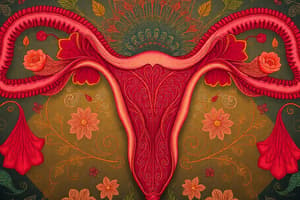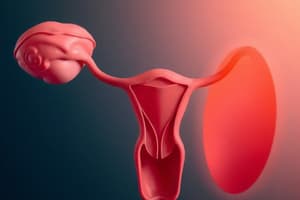Podcast
Questions and Answers
Which organ is primarily responsible for the production of sperm in males?
Which organ is primarily responsible for the production of sperm in males?
- Vas deferens
- Epididymis
- Seminal vesicles
- Testes (correct)
What is the primary site of fertilization in the female reproductive system?
What is the primary site of fertilization in the female reproductive system?
- Fallopian tubes (correct)
- Vagina
- Uterus
- Ovary
During which stage of pregnancy do major organs and structures develop?
During which stage of pregnancy do major organs and structures develop?
- Germinal Stage
- Embryonic Stage (correct)
- Fetal Stage
- Menstrual Stage
What hormone is primarily responsible for triggering ovulation in the menstrual cycle?
What hormone is primarily responsible for triggering ovulation in the menstrual cycle?
Which method of contraception involves surgical alteration of reproductive organs?
Which method of contraception involves surgical alteration of reproductive organs?
What is the typical outcome of oogenesis in females during a menstrual cycle?
What is the typical outcome of oogenesis in females during a menstrual cycle?
Which phase of the menstrual cycle involves the shedding of the uterine lining?
Which phase of the menstrual cycle involves the shedding of the uterine lining?
How many chromosomes are present in a normal human cell?
How many chromosomes are present in a normal human cell?
Flashcards are hidden until you start studying
Study Notes
Human Reproduction
Overview
- Human reproduction is a biological process through which new individuals are produced.
- It is primarily sexual, involving the fusion of male and female gametes.
Male Reproductive System
-
Components:
- Testes: Produce sperm and hormones (testosterone).
- Epididymis: Stores and matures sperm.
- Vas deferens: Transports sperm to the ejaculatory duct.
- Seminal vesicles & Prostate gland: Contribute to semen production.
- Penis: Delivers sperm to the female reproductive tract.
-
Spermatogenesis:
- Occurs in the testes.
- Production of sperm cells from spermatogonia.
- Happens continuously from puberty onward.
Female Reproductive System
-
Components:
- Ovaries: Produce eggs (ova) and hormones (estrogen, progesterone).
- Fallopian tubes: Site of fertilization; transport eggs to the uterus.
- Uterus: Supports fetal development; endometrium thickens for implantation.
- Vagina: Birth canal and receptacle for sperm.
-
Oogenesis:
- Occurs in the ovaries.
- Formation of ova from oogonia; typically one egg is released per menstrual cycle.
Fertilization
- Process:
- Occurs when a sperm cell penetrates an egg.
- Usually takes place in the fallopian tubes.
- Forms a zygote, which begins cell division and development.
Pregnancy
- Stages:
- Germinal Stage: First two weeks; zygote implants in the uterus.
- Embryonic Stage: Weeks 3-8; major organs and structures develop.
- Fetal Stage: Week 9 to birth; growth and maturation of the fetus.
Menstrual Cycle
-
Phases:
- Menstrual Phase: Shedding of the uterine lining (days 1-5).
- Follicular Phase: Development of follicles in the ovaries (days 1-13).
- Ovulation: Release of an egg (day 14).
- Luteal Phase: Preparation for potential implantation (days 15-28).
-
Hormones Involved:
- Follicle-stimulating hormone (FSH), Luteinizing hormone (LH), Estrogen, and Progesterone.
Contraception
- Methods:
- Barrier methods (condoms, diaphragms)
- Hormonal methods (pills, patches, injections)
- Intrauterine devices (IUDs)
- Natural methods (abstinence, fertility awareness)
- Surgical methods (vasectomy, tubal ligation)
Reproductive Health
- Key Aspects:
- Regular check-ups and screenings (e.g., Pap smears, STI testing).
- Understanding reproductive rights and access to healthcare.
- Importance of education on safe sex practices.
Genetic Inheritance
- Chromosomes: Humans have 46 chromosomes (23 pairs).
- Sex Chromosomes: XX (female), XY (male); determine biological sex.
- Inheritance Patterns: Mendelian inheritance, sex-linked traits.
Conclusion
- Human reproduction involves complex physiological processes and is influenced by various biological, hormonal, and environmental factors.
- Understanding these processes is crucial for reproductive health and education.
Human Reproduction Overview
- Biological process producing new individuals primarily through sexual means via fusion of male and female gametes.
Male Reproductive System
- Testes produce sperm and hormones such as testosterone.
- Epididymis stores and matures sperm cells.
- Vas deferens transports sperm to the ejaculatory duct.
- Seminal vesicles and prostate gland contribute fluids to semen production.
- Penis functions as the delivery mechanism for sperm into the female tract.
- Spermatogenesis occurs continuously in the testes, producing sperm cells from spermatogonia post-puberty.
Female Reproductive System
- Ovaries produce eggs (ova) and hormones like estrogen and progesterone.
- Fallopian tubes are the site for fertilization and transport of eggs to the uterus.
- Uterus supports fetal development and prepares the endometrium for implantation.
- Vagina serves as a birth canal and receptacle for sperm.
- Oogenesis in the ovaries results in the formation of ova; typically, one egg is released each menstrual cycle.
Fertilization
- Occurs when a sperm penetrates an egg, usually in the fallopian tubes.
- This process creates a zygote, which begins cell division and development.
Pregnancy
- Germinal Stage: The first two weeks where the zygote implants in the uterus.
- Embryonic Stage: Lasts from weeks 3-8, wherein major organs and structures develop.
- Fetal Stage: Week 9 until birth, focusing on growth and maturation of the fetus.
Menstrual Cycle
- Phases:
- Menstrual Phase: Shedding of uterine lining (days 1-5).
- Follicular Phase: Development of ovarian follicles (days 1-13).
- Ovulation: Release of an egg (day 14).
- Luteal Phase: Preparation for potential implantation (days 15-28).
- Hormones Involved: Follicle-stimulating hormone (FSH), Luteinizing hormone (LH), Estrogen, and Progesterone.
Contraception
- Methods:
- Barrier methods: Condoms, diaphragms.
- Hormonal methods: Pills, patches, injections.
- Intrauterine devices (IUDs) to prevent pregnancy.
- Natural methods: Abstinence, fertility awareness.
- Surgical methods: Vasectomy for men and tubal ligation for women.
Reproductive Health
- Importance of regular check-ups and screenings (e.g., Pap smears, STI testing).
- Understanding reproductive rights and ensuring access to healthcare.
- Emphasizing education on safe sex practices to promote reproductive health.
Genetic Inheritance
- Humans possess 46 chromosomes arranged in 23 pairs.
- Sex chromosomes: XX for females and XY for males, which determine biological sex.
- Inheritance follows Mendelian patterns, including sex-linked traits.
Conclusion
- Complex physiological processes govern human reproduction, affected by biological, hormonal, and environmental factors.
- Knowledge of these mechanisms is essential for enhancing reproductive health and education.
Studying That Suits You
Use AI to generate personalized quizzes and flashcards to suit your learning preferences.




